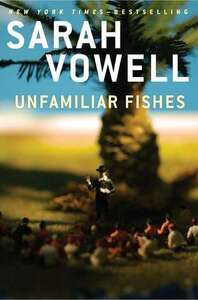Take a photo of a barcode or cover
funny
informative
sad
medium-paced
I loved this delectably snarky yet educational book and would have given it five stars had it not been for the poor editing.
This book didn't suck me in like previous [a:Sarah Vowell|2122|Sarah Vowell|http://photo.goodreads.com/authors/1297911965p2/2122.jpg] ones did ([b:Assassination Vacation|8014090|Assassination Vacation|Sarah Vowell|http://photo.goodreads.com/books/1270893913s/8014090.jpg|824686] and [b:The Wordy Shipmates|2845287|The Wordy Shipmates|Sarah Vowell|http://photo.goodreads.com/books/1256066727s/2845287.jpg|3093704]. It was a similar history, personalized with her own experiences traveling to sites with the family and her own family's history with government intervention and missionaries (since she is part Cherokee). Not as strong as the previous two, but I did find it illuminating in several ways.
First, I had never thought much of how Hawaii came to be annexed in 1898, nor did I think of the real potential that many native Hawaiians are still angry about that.
Second, I think the reason that I did not enjoy this book as much as previous ones was that the missionaries didn't seem to be anywhere near as interesting as the European founders of New England, and that many of the native Hawaiian royalty seemed to be doing everything within their power to give up control of the island nation. To say that Hawaii was poorly governed in the 19th Century is to put it mildly. While I can still understand anger at the annexation, there was a power vacuum, and the European settlers exploited it. Strong do what they can, weak endure what they must, same rule as when [a:Thucydides|957|Thucydides|http://photo.goodreads.com/authors/1206544282p2/957.jpg] said it 2500 years ago.
I was also hoping the book would have discussed more about the Spanish-American War. It touched on it, but not extensively.
First, I had never thought much of how Hawaii came to be annexed in 1898, nor did I think of the real potential that many native Hawaiians are still angry about that.
Second, I think the reason that I did not enjoy this book as much as previous ones was that the missionaries didn't seem to be anywhere near as interesting as the European founders of New England, and that many of the native Hawaiian royalty seemed to be doing everything within their power to give up control of the island nation. To say that Hawaii was poorly governed in the 19th Century is to put it mildly. While I can still understand anger at the annexation, there was a power vacuum, and the European settlers exploited it. Strong do what they can, weak endure what they must, same rule as when [a:Thucydides|957|Thucydides|http://photo.goodreads.com/authors/1206544282p2/957.jpg] said it 2500 years ago.
I was also hoping the book would have discussed more about the Spanish-American War. It touched on it, but not extensively.
It's a testament to how much I like Sarah Vowell that I even picked up this book, as I would otherwise not have been particularly interested in the history of Hawaii. I love her humor and wish she'd put a little more of it in this book, but I can hardly complain, as I learned a lot and enjoyed reading it.
funny
hopeful
informative
reflective
medium-paced
informative
reflective
slow-paced
funny
informative
medium-paced
funny
informative
lighthearted
reflective
fast-paced
A crash course on Hawaiian history by the wry Sarah Vowell. I listened to the audiobook, which is narrated by the author. I found it interesting and entertaining. Worthwhile if you like the author or are interested in the subject.
I just adore her. Seriously girl crushing. Ok, on with the book. If you're an anglo-American and you've ever felt "icky" (read:guilty) traveling to Hawaii on vacation, you'll feel even worse after reading this. Sarah Vowell never pulls punches in her history lessons, and we all need to sit up and listen.



